Can You Freeze Onions From The Garden
Yes, you can freeze onions! You don't even need to blanch them or pre-treat them in any way. It's super easy! Simply peel, chop (diced or sliced) and freeze.
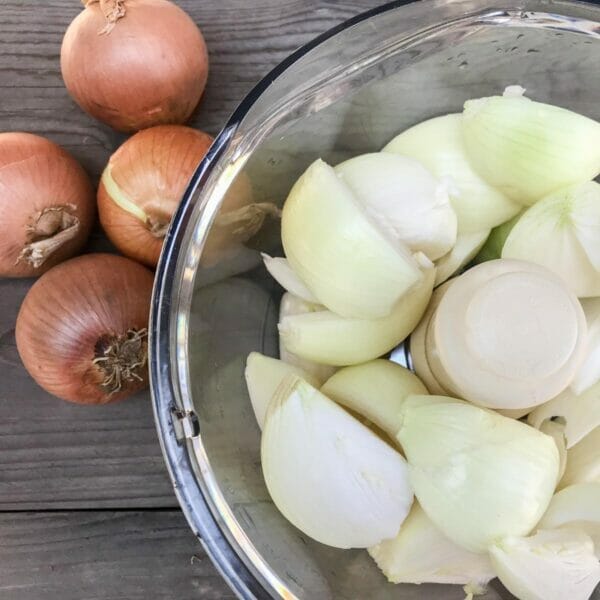
Also Read: How to Store Onions, How to Dehydrate Onions, How to Make French Onion Soup
Two Reasons to Freeze Onions
You may be wondering, why bother freezing onions, when they store well for weeks? I get it, it seems odd, but here are two very good reasons to freeze onions.
1. It's Perfect For When You Don't Have Ideal Storage Space
If your onions regularly sprout, go soft, get moldy or taste funny, your current storage method may not be ideal.
Onions can store well, but they're picky. They prefer being stored at 4-10°C /40-50° F, that's warmer than your fridge but cooler than room temperature. If you store onions too hot, too cold or too humid, they may sprout, go moldy or go soft. Oh and they don't like being stored next to potatoes – the natural gases released by potatoes will make onions sprout faster, and vice versa. So you see, finding the right spot can be tricky.
That's why freezing or dehydrating are good options. Of course delicious recipes like French Onion Soup, caramelized onions on Focaccia or sautéed onions and mushrooms are good too!
2. It's A Convenient Time Saver
If you cook regularly, you know that 90% of recipes include chopped, diced or sliced onions. Can you imagine how convenient having pre-sliced onions or diced onions can be! It's truly a time saver.
It was a game changer for me. Instead of chopping and slicing an onion every night, I simply go to the freezer and pull out what I need. No daily chopping required. No onion odor on fingers. No cleaning the cutting board.
Consider freezing onions if…
– you don't have a proper storage place for them
– you hate having to chop fresh onions every time you make dinner
– you enjoy the convenience of pre-cut food and the satisfaction and low price of doing it yourself
Freezing Onions – The Video
Watch this video. Not just for the helpful tips, but to go back in time to my VERY FIRST YouTube video, when my kitchen was orange, my stove was white and my hair had no silver. I'm a bit of a goofball in it, but the message is sound. Enjoy!
How to Freeze Onions – Step By Step
1. Chop Onions
Dice onions to your preferred size – where in slices or small cubes. I just don't recommend freezing whole or half onions (see FAQs below).
Use a sharp knife, mandolin or food processor, whichever you prefer. When I'm doing big batches like this, I like using my food processor. I use the slicing blade for slices and the regular chopping blade for diced onions.
Pro Tip: When using the food processor for diced onions, only pulse a few times to avoid tiny turning your onions into a liquid mush. You DO NOT want to process them too long.
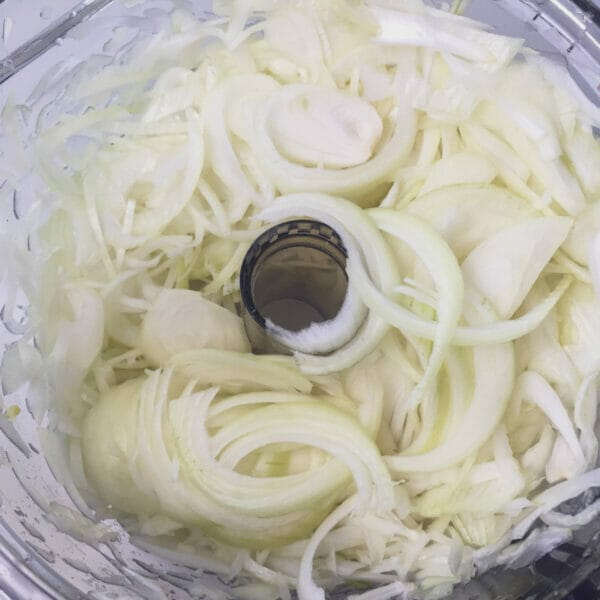
2. Place in Freezer Bag
The key to freezing onions is to seal them well in a high quality bag or container that will prevent any odor. I prefer using thick, plastic freezer bags – not the all purpose kind, the thicker freezer grade bags.
Squeeze out as much air as you can to prevent freezer burner and allow for as little headspace as possible.
You also want to make sure you can easily use your frozen onions. That's why I recommend either freezing them in pre-measured amounts or freezing them in a thin layer where you can easily break off frozen pieces as needed. This avoids having big clumps of frozen onions.
Here are Two Freezing Methods (#1 is my favorite!)
Option 1: Freeze onions in a thin layer in freezer bags. It's not quite a single layer of onions, but it's thin enough so I can break off pieces easily. This is how I usually freeze onions. I add a random amount of onions to a freezer bag and flatten it so it's quite thin. I squeeze out as much air as possible and then seal the bag well.
When it freezes, I can easily break off a chunk of onions. It's never an exact measurement, but most recipes are pretty flexible when it comes to onions. I usually break off enough to completely cover the bottom of my cooking pot. You decide – add more or less based on your preference.
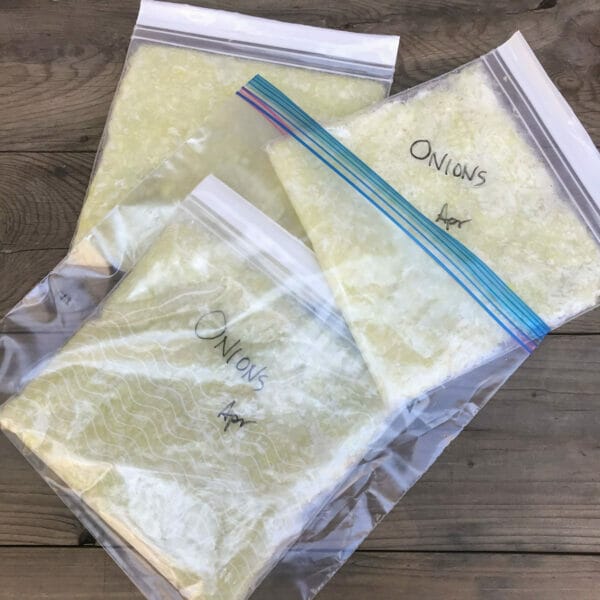
Option 2: Freeze in pre-measured amounts. I follow the general rule of onion measurements 1 medium onion=1 cup of diced onions. So I freeze either half cup or full cup mounds placed on plastic wrap, parchment paper or waxed paper. Wrap and place several bundles in a large freezer bag. Seal well and freeze.
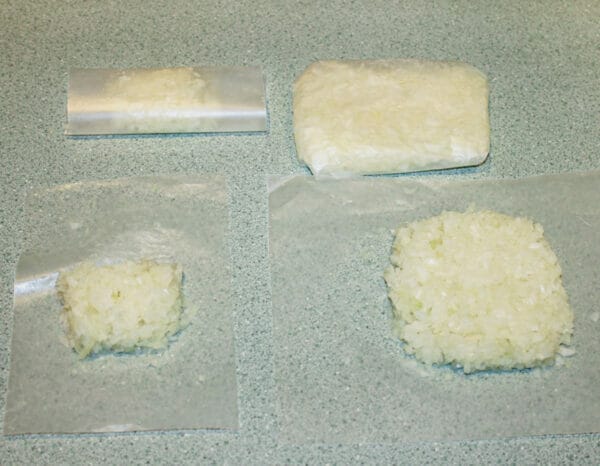
Another option is to freeze the onions in ice cube trays. Just be sure to wrap the tray in a bag while freezing – you do not want onion odor in your freezer. You'll want to soak the tray in baking soda and vinegar before using it for ice cubes again! That's a lot of fuss in my opinion, I'd rather just freeze onions in bags as outlined in Option 1.
3. Seal and Freeze
Finally, seal and freeze for up to three months. I wouldn't recommend storing any longer because they will start to develop off flavors. They won't go bad or be unsafe, they just won't be as tasty.
When I make a big batch of onions, I end up with several thin bags. I store these bags together in a larger freezer bag for extra protection. This big bag is stored in the big freezer in the basement. One of the smaller bags stays in my fridge freezer for every day use.
Frequently Asked Questions About Freezing Onions
1. Will Onions Change When Frozen?
Like any unblanched vegetable, the flavor of frozen onions will change over time. The longer they stay in the freezer, the stronger their flavor will become. For that reason, I only freeze about five pounds of onions at a time, or however many onions I can use within three months.
The texture of onions will also change, they will become much softer and lose their crunch. They won't be suitable for salads or any raw dishes, but they're great in cooked dishes like soups, stews, curries, casseroles, etc. They will release a lot of moisture when they hit the pan, but it evaporates pretty quickly.
Remember, when using a food processor, Do Not chop or process too fine. Freeze slices instead if you prefer bigger pieces of onions in your finished dish.
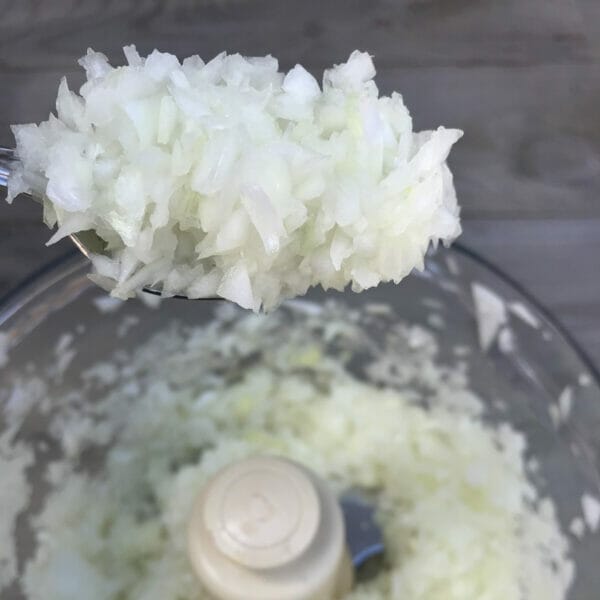
2. Will My Freezer Smell Like Onions?
I've never had an issue with this. The key is to use high quality freezer bags or airtight containers and seal them very well. If you want to use extra precaution, you can double bag onions or place a bag in an airtight container before storing in the freezer.
Also make sure the outside of the bag is clean and dry, so there are no onion juices or bits stuck on the outside.
This is why I, personally, don't flash freeze or use ice cube trays when freezing onions – the risk of lingering onion odor in my freezer by leaving an open tray of onions in there, even for a couple of hours is just too high.
3. Can I Freeze Whole Onions?
Freezing whole onions is not recommended. They will be hard to thaw and use. It is best to cut onions before freezing. If you desperately want to freeze whole onions, you need to blanch them – boil them in hot water for about 7 minutes or until the very center is heated through. It's really not very convenient.
4. Do You Need to Blanch Onions for Freezing?
The National Center for Home Food Preservation says blanching is not required for diced or sliced onions. They do recommend blanching whole onions.
5. How Long Will Frozen Onions Last?
For best quality, use frozen onions within three months. The flavor starts to change quite a bit after that point.
6. What Are the Best Onions to Freeze?
You can follow these simple steps to freeze red onions, white onions, yellow onions, shallots, green onions, leeks. Use big or small onions. Pretty much whatever type of onion you have.
Ideally, for best flavour, freeze onions that are at their peak of flavour and freshness. That said, if you notice some onions starting to go soft or starting to sprout, freeze them right away before they spoil.
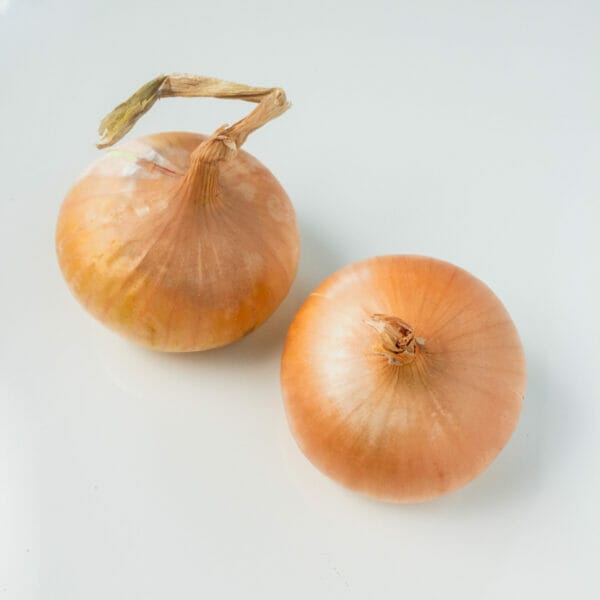
5. How Do You Use Frozen Onions ?
I use frozen onions in just about any cooked dish imaginable! You can fry them and add them to soups, casseroles, stews, curries, casseroles, meatloaf, etc. I just don't recommend them for salads or as fresh toppings.
6. How Do You Avoid Tears When Chopping Onions?
Here are a few ideas for you to try:
- use a food processor when chopping large amounts – just look away when you open the lid
- chill the onions in the fridge for 30 minutes before chopping
- leave the root end in tact until the very end – that's where most of the sulfur compounds that cause tears are located
- wear goggles – seriously
- light a candle while chopping to consume the fumes
- use a fan to blow the fumes away from you

So, there you have How to Freeze Onions. What do you think, is this something you'll try? If you do, let me know or take a photo and tag #getgettys so I can see it and like it!
Getty Stewart is a Professional Home Economist, speaker, frequent media guest and writer dedicated to putting good food on tables and agendas. She is the author of several recipe books on enjoying and preserving fruit, Founder of Fruit Share, a mom and veggie gardener. Sign up to get articles by Getty delivered to your inbox. You'll get recipes, practical tips and great food information like this.
This post was updated in 2021 from the original post in 2014.
Can You Freeze Onions From The Garden
Source: https://www.gettystewart.com/why-freezing-onions-is-a-good-idea/#:~:text=Yes%2C%20you%20can%20freeze%20onions,diced%20or%20sliced)%20and%20freeze.
Posted by: dixonknour2001.blogspot.com

0 Response to "Can You Freeze Onions From The Garden"
Post a Comment